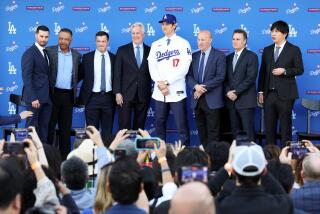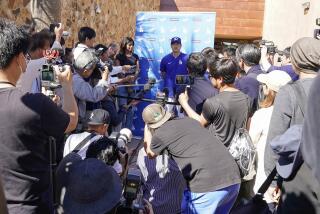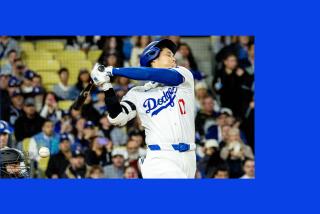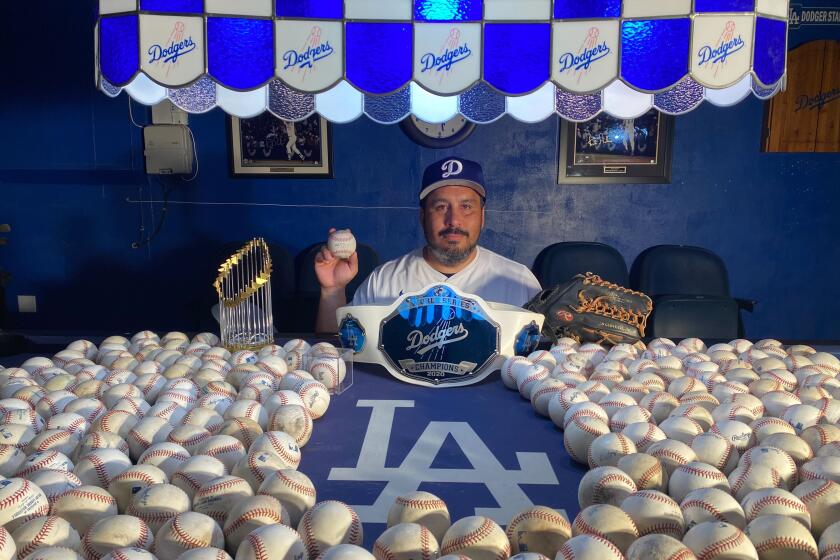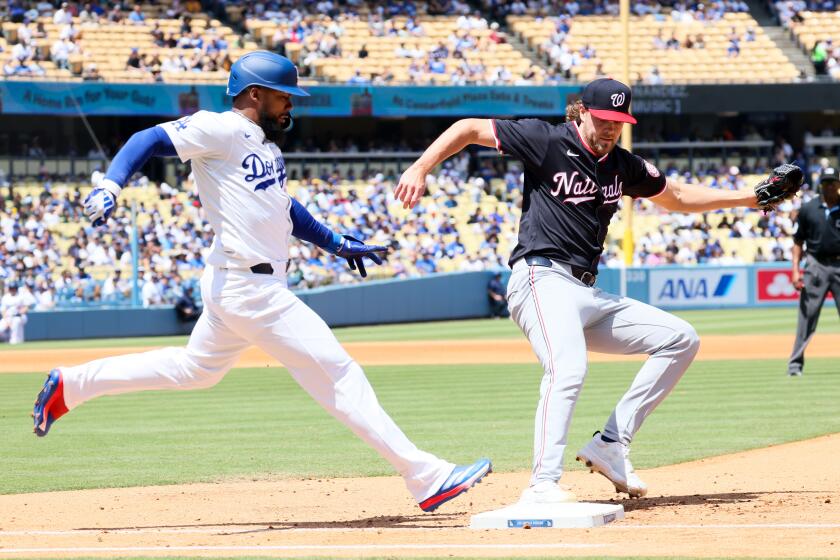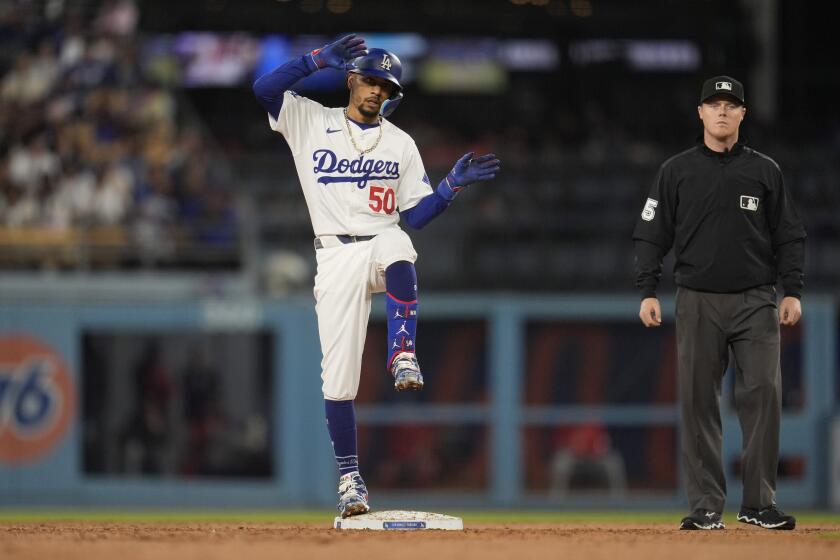It’s Remake or Break
Having completed an unprecedented overhaul of a first-place team late in a season, Paul DePodesta, the Dodgers’ first-year general manager, rested and reflected Monday on what he had accomplished, and risked, during a whirlwind weekend, engineering four deals involving 14 players in an effort to bring a World Series championship to Los Angeles for the first time since 1988.
The 31-year-old executive executed a dramatic remake of a team that sits atop the National League West, has the third-best record in baseball and had the best mark in July at 21-7. Unfazed about industry or fan backlash for trading away one-fifth of a successful, close-knit group, DePodesta cast off catcher Paul Lo Duca, key late-inning reliever Guillermo Mota, left fielder Dave Roberts, right fielder Juan Encarnacion and left-handed reliever Tom Martin in deals with Florida, Arizona, Atlanta and Boston.
The trades netted pitcher Brad Penny, center fielder Steve Finley, first baseman Hee Seop Choi, catcher Brent Mayne and minor leaguers, but DePodesta failed to reel in Randy Johnson, who contrary to reports was never close to joining the Dodgers, or Colorado catcher Charles Johnson, who requested a contract extension to rejoin the team, according to numerous baseball officials.
DePodesta is under the microscope, having been roundly criticized by fans in the wake of his dizzying moves, and some baseball officials have privately suggested he did too much, trying to fix a team that wasn’t broken. However, DePodesta had a plan, and the full support of co-owner Frank McCourt, to reshape the roster as much as he could before last Saturday’s non-waiver deadline. It wasn’t easy, but for better or worse, mission accomplished.
“With all the stress, all the emotion and everything that was built up into it, and knowing what was going to happen to me publicly for making these decisions, it was exhausting, but I was going to find a way to come through on the vision,” said DePodesta, in the first year of a five-year contract. “This has been a very emotional time for me and obviously for our club, but at the end of the day, when it came down to making this club better, it wasn’t personal. It was only business.”
DePodesta declined to comment on his behind-the-scenes maneuvering that produced the most roster upheaval the team has experienced since the stunning 1998 trade that sent star catcher Mike Piazza to Florida. But others in the organization, as well as National League executives, paint a picture of a focused general manager who determined the Dodgers simply weren’t good enough to compete in October, and figured he could quickly make them better.
Shortly after joining the organization on the eve of spring training, DePodesta confided to some outside the organization that his predecessors in the general manager’s office had assembled an operation in need of a complete overhaul, and he targeted the All-Star break to begin dismantling an overpriced roster.
But a funny thing happened on the way to beginning the rebuilding process -- the Dodgers played much better than expected. They raced out to a 22-10 start and held a three-game lead in the division on May 12.
But then they lost eight in a row and 12 of 14. The Dodgers were 40-37 and 3 1/2 games behind in the division after a 7-3 loss to the Angels on July 2 at Angel Stadium. Internally, DePodesta and his staff were trying to assess whether they would be buyers or sellers as the July 31 deadline approached.
Then the Dodgers got hot again, winning eight of nine to close the first half, and nine of 10 coming out of the All-Star break. DePodesta had seen enough, informing his staff in a meeting that he planned to “go full blast” to upgrade the roster, in part because he determined the team, despite its impressive play, wouldn’t last long in October.
Although DePodesta had weeks of preliminary trade talks with other teams, acquiring Finley was his focus from the outset, a Dodger official said. In fact, had DePodesta been able to trade Encarnacion for Finley, a four-time Gold Glove Award winner, the Dodgers might have been back-burner news over the weekend instead of the talk of baseball.
One Dodger insider described DePodesta as being “on a mission” to find a taker for Encarnacion, who is owed $4.435 million in 2005, has a .289 on-base percentage (.311 for his career) and is expected to undergo shoulder surgery after the season. DePodesta had hoped to bolster the front of the rotation for the stretch and next season, but sources said he could have accepted sticking with the majority of the roster as long as he replaced Encarnacion with Finley.
Arizona General Manager Joe Garagiola Jr. made it clear that wouldn’t happen, triggering DePodesta’s interest in finding alternatives for moving Encarnacion, bringing Finley to the Dodgers and keeping the two-time All-Star from San Diego, the only other team Finley would have waived his no-trade right to join.
The trade situation intensified late Wednesday when the Marlins officially offered Penny, Choi and double-A left-hander Bill Murphy for Lo Duca, Mota and Encarnacion. The Dodgers also had to agree to contribute $2 million to the package because of Florida’s payroll situation.
Penny was said to be “incredibly attractive” to DePodesta, who expressed concerns to his top lieutenants about going into the off-season with only Jeff Weaver, Kazuhisa Ishii and Edwin Jackson projected to be in the 2005 rotation.
DePodesta and Manager Jim Tracy had a long telephone conversation Wednesday after a 5-4 loss to Colorado at Coors Field. DePodesta realized that Tracy did not want to trade Mota, the primary setup man for closer Eric Gagne, and that losing the right-hander would alter the majors’ most successful bullpen formula.
But DePodesta stressed the importance of making the deal in order to make others, and Tracy was on board. It had become clear to DePodesta that he could not get Randy Johnson or Finley for prospects, and Florida was the only team that would take Encarnacion, a member of last season’s World Series title team. DePodesta also realized the Dodgers would not be able to add the player they wanted without disrupting the major league roster. He would have to think big or do nothing at all.
On Thursday, the Dodgers agreed to trade a minor leaguer to Colorado for Charles Johnson, who had to be persuaded to waive his no-trade clause. Colorado also agreed to pay all but $2 million of the approximately $12.1 million Johnson would have been owed.
DePodesta made the deal before agreeing to Florida’s proposal because he wanted to have another veteran catcher in place first, and it also enabled the Dodgers to include top catching prospect Koyie Hill in a proposal for Finley.
Meanwhile, there was rampant speculation about the Dodgers’ trading for Randy Johnson, who would have had to approve a deal. The Diamondbacks wanted more than the Dodgers would offer for the five-time Cy Young Award winner, but DePodesta remained on the periphery while still pursuing Finley, his No. 1 target.
DePodesta informed Garagiola the Dodgers would be going in another direction with Lo Duca and Mota, the foundation of a package the Diamondbacks wanted for Johnson. (The Diamondbacks also wanted top Dodger pitching prospects, including Jackson, in that deal.)
He then turned back to the Marlins, attempting to trim the proposed six-player deal. DePodesta sought to get Penny, Choi or Murphy in revised versions of the proposal, but couldn’t agree on another combination, and the Marlins held firm on not taking back Encarnacion unless Mota and Lo Duca were included.
While Dodger trainers spoke with their counterparts on the other teams, exchanging medical information about the players involved in the potential deals, DePodesta continued to solidify a contingency plan for another catcher in case something went wrong in the Charles Johnson deal. He raised Mayne’s name with Garagiola.
DePodesta also spoke with Tracy after the team’s 3-2 victory over Colorado on Thursday, informing the manager he planned to pull the trigger on the Florida deal Friday afternoon.
DePodesta and Tracy talked about how to handle the emotional fallout in the clubhouse that would follow the trading of Lo Duca, a fan favorite and considered the heart and soul of the team, and the popular Mota. Some on the team reassured DePodesta there would not be a player revolt if he traded Lo Duca. And although Lo Duca played a big role on and off the field, the Dodgers had not won a championship with him, a team official said.
Still wanting to get Charles Johnson before trading Lo Duca, DePodesta spoke with agent Scott Boras at about 1 p.m. Friday. Boras told DePodesta he was in an airport, preparing to fly to New York, and would speak with him about Johnson, who played for the Dodgers in 1998, when he landed.
DePodesta became concerned when he spoke with Johnson shortly after his conversation with Boras. Johnson said he would talk with Boras after Colorado’s game and contact the Dodgers on Saturday, so DePodesta looked harder at Mayne.
The Dodgers and Marlins agreed to terms Friday at 2:30 p.m. With that deal, the Dodgers were officially out of pursuing Randy Johnson, whom team officials said DePodesta figured he wouldn’t get, but still was determined to try.
San Francisco General Manager Brian Sabean said he wasn’t surprised that Randy Johnson stayed in Arizona. “I never thought he was going anywhere, for a lot of reasons ...” he said. “If he wanted to go somewhere, he probably would have. If they weren’t asking for the world, he probably would have gone somewhere.”
DePodesta also was busy working on deals to send Martin to Atlanta and Roberts to Boston, if Finley could be acquired before the fast-approaching deadline.
Boras informed the Dodgers late Friday that Charles Johnson would approve the trade, but had some “administrative things” he needed resolved.
Early Saturday morning, however, Boras phoned again, saying Johnson would only approve the deal if the Dodgers gave him a contract extension for 2006, a team official said. DePodesta, close to nailing down the deal for Finley and Mayne, pending Finley’s approval, declined to acquire Johnson, whose contract for 2005 would have increased from $9 million to $10 if he were traded.
The final two hours before the deadline were crazy, a Dodger official said.
DePodesta spoke with Finley and his agent, Tommy Tanzer, “about half a dozen times” in the hour after the Dodgers and Diamondbacks agreed to terms at 10:15 a.m. Finley, who can become a free agent after the season, did not seek a contract extension for his approval, but had reservations about joining the Dodgers unless Milton Bradley was comfortable moving from center field.
DePodesta and Tracy, among those in DePodesta’s command central hotel suite in San Diego, allayed Finley’s concerns about Bradley. Finley approved the deal -- the Dodgers sent Murphy, Hill and minor league outfielder Reggie Abercrombie to Arizona -- after the Dodgers informed him of club rules regarding children in the clubhouse and wives traveling on chartered flights.
Martin was summoned to the suite and informed he was headed to the Braves for a minor leaguer. Roberts, who would have played little with the arrival of Finley, went to Boston for a prospect.
And with that, DePodesta was done.
“For a first-year GM, I applaud him,” Padre General Manager Kevin Towers said. “I’m sure he and his baseball people felt that these were changes that needed to be made if they wanted to win the division and go deep into the postseason. We’ll know more in the next two or three months, but rarely do you see a first-year GM make those types of moves, especially when they’re in first place.
“There are a lot of GMs out there worried about [public relations] and backlash from fans. That shows me that he did what he felt was right for the organization, regardless of fan reaction and industry reaction. We’ll see what happens, but they were very, very busy, probably a lot busier than I expected.”
*
(BEGIN TEXT OF INFOBOX)
Faded Blue
Another possible reason for the Dodger roster overhaul: The team has fallen further behind in the standings down the stretch every season since Jim Tracy took over as manager. A look:
2001
*--* TIME PERIOD REC. POSITION Through July 31 61-46 2nd place, five games behind Arizona After July 31 25-30 3rd place, six games behind Arizona 2002 TIME PERIOD REC. POSITION Through July 31 60-47 2nd place, five games behind Arizona After July 31 32-23 3rd place, six games behind Arizona 2003 TIME PERIOD REC. POSITION Through July 31 54-53 4th place, 13 1/2 games behind San Francisco After July 31 31-24 2nd place, 15 1/2 games behind San Francisco
*--*
*
After-Burnout?
A look at the numbers before and after the All-Star break from 2001 to 2003 for the four key players the Dodgers traded:
PAUL LO DUCA
*--* AB H HR RBI AVG OB% SLG% Before 835 270 25 117 323 380 489 After 773 195 17 89 252 306 374 GUILLERMO MOTA IP H ER BB SO W-L ERA Before 129 1/3 103 39 34 103 4-3 2.71 After 86 71 41 37 76 4-6 4.29 DAVE ROBERTS AB H Runs SB AVG OB% SLG% Before 445 123 70 44 276 345 344 After 377 95 52 41 252 341 332 JUAN ENCARNACION AB H HR RBI AVG OB% SLG% Before 949 260 38 153 274 324 466 After 653 161 17 78 247 294 395
*--*
More to Read
Are you a true-blue fan?
Get our Dodgers Dugout newsletter for insights, news and much more.
You may occasionally receive promotional content from the Los Angeles Times.
